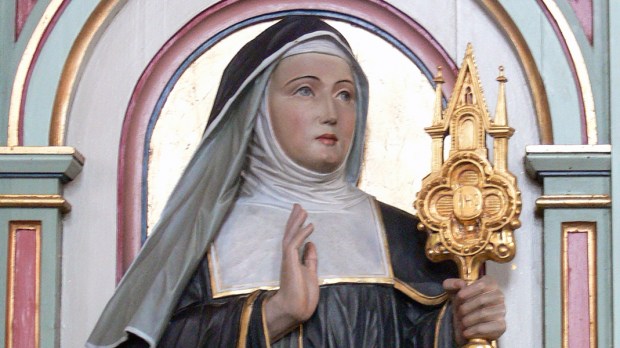Her parents were of the esteemed house of Falconieri and highly regarded. They had waited and prayed a long time for a child, and finally, in 1270, their prayers were answered. They were blessed with a daughter and named her Juliana.
Juliana displayed unusual spiritual tendencies very early in life. When just a toddler, she began speaking the names of Jesus and Mary. It was looked upon by many as a sign of the child’s future holiness.
Juliana’s uncle, Alexis Falconieri, was one of the seven founders of the Servite Order. He was her instructor and mentor and had told Juliana’s mom that she had not given birth to a mortal maiden, but an angel. Under his influence, Juliana decided at a young age to follow the consecrated life.
After her father’s death, she received the habit of the Third Order of Servites from Philip Benizi, who was Prior General of the Order. She was only 15, so she remained at home following the Rule that Prior Benizi had given her. The amended Rule stated that Juliana would stay there until her mother’s death.
In 1305, after her mom died, Juliana and several companions moved into a house of their own. It was located in the Grifoni Palace in Florence, and this was the first convent of the Sisters of the Third Order of Servites. The main devotion of the Servites was to Our Lady of Sorrows and the main activity was caring for the sick. Juliana was made Mother Superior and would serve in that position for the rest of her life.
Juliana, who suffered from chronic gastric problems, always was a servant to her Sisters. Although in pain most of the time, Juliana worked tirelessly to convert sinners, reconcile enemies, and heal the sick. She was often seen deeply caught up in ecstasy, and sometimes the rapture would last all day.
While inside the convent, she would perform the most menial tasks, such as scrubbing floors, mending clothes, and preparing food. She was a shining example to her followers, practicing the virtues of charity, chastity, mortification, and penance at all times.
Legend says she was so spiritually uplifted that she never gazed into a mirror, trembled when sin was mentioned, and frequently fainted when hearing scandalous gossip. Although very hard on herself, she was always gentle and caring to others. Other young women of Florence heard of this holy nun and began joining the community. The order grew rapidly.
Mother Juliana was so filled with faith and love, especially for Christ in the Holy Eucharist, that she let the hard wooden floor be her bed and only slept for two to three hours a night. The rest of the night was spent in prayer. She fasted every Saturday on bread and water. Two days a week, she took just a bit of water because she was going to receive Holy Communion. The other days she did take some food, but very little and only the most basic available—anything else she refused to touch.
Mother Juliana’s life-long personal fasting and sacrifice took their toll. She was so sick that while she lay on her death bed, she could not receive Holy Communion. She asked the priest if he would spread a corporal upon her chest and lay the Host on it. Soon after, the Host vanished, and Juliana died.
When the sisters came to wash her body, they discovered the imprint of the cross on her heart; it was the same as it was on the Host. The date was June 19, 1341. Her unmatched devotion to Christ in the Eucharist earned her the title of Saint of the Holy Eucharist.
She is not to be confused, however, with another Juliana, who was instrumental in promoting the feast of Corpus Christi: Juliana of Liege.
Read more:
Juliana of Liege, the 13th-century religious woman who brought us Corpus Christi
Juliana was honored as a saint immediately after her death. She was officially canonized by Pope Clement XII on June 16, 1737. Her order has houses in Europe, and England, the USA, and Canada. The sisters are involved in parish ministry, hospital and prison chaplaincies, the care of cancer patients and AIDS patients.
St. Juliana Falconieri’s feast day is June 19, and we ask her to pray for us.

